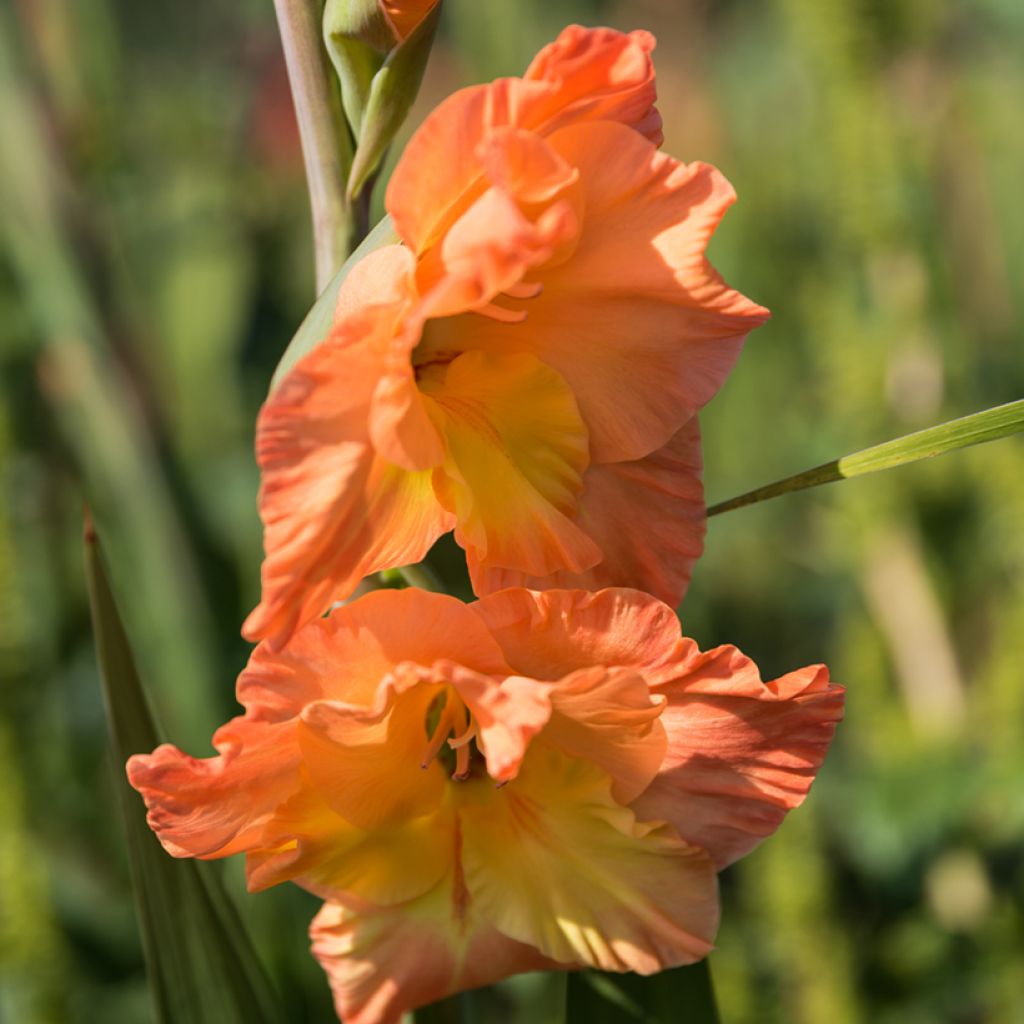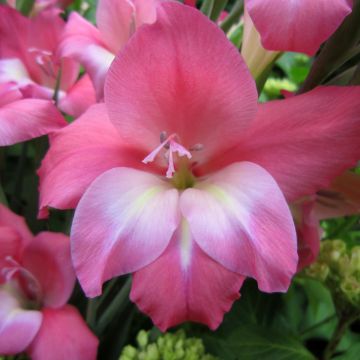

Gladiolus x grandiflorus Olympic Flame - Sword Lily
Gladiolus x grandiflorus Olympic Flame - Sword Lily
Gladiolus x grandiflorus Olympic Flame
Sword Lily, Gladiolus
Special offer!
Receive a €20 voucher for any order over €90 (excluding delivery costs, credit notes, and plastic-free options)!
1- Add your favorite plants to your cart.
2- Once you have reached €90, confirm your order (you can even choose the delivery date!).
3- As soon as your order is shipped, you will receive an email containing your voucher code, valid for 3 months (90 days).
Your voucher is unique and can only be used once, for any order with a minimum value of €20, excluding delivery costs.
Can be combined with other current offers, non-divisible and non-refundable.
Home or relay delivery (depending on size and destination)
Schedule delivery date,
and select date in basket
This plant carries a 6 months recovery warranty
More information
We guarantee the quality of our plants for a full growing cycle, and will replace at our expense any plant that fails to recover under normal climatic and planting conditions.
Would this plant suit my garden?
Set up your Plantfit profile →
Description
The Gladiolus 'Olympic Flame' is a tall variety, ideal for mid or back of borders, or large borders. Its flowers bloom in summer in a fairly soft orange hue, slightly bleached in places, beautifully lit by a yellow throat. The petals are finely plicate, undulating at the edge. The stems are strong, stout, covered with numerous buds. As graceful as they are bright, the floral spikes also create beautiful arrangements in bouquets.
Originating from Africa, Europe, the Middle East, belonging to the Iridaceae family, the most colourful Gladiolus species come from South Africa. Cultivated gladioli are hybrids with large flowers, divided into 3 main groups: Grandiflorus (large-flowered), Primulinus, and Nanus (butterflies). 'Olympic Flame' is part of the Grandiflorus group. It is a perennial herbaceous plant with corms (globose bulbs), broad sword-shaped leaves, arranged fan-shaped, forming a clump of approximately 1.10 to 1.40 m in flower height, depending on growing conditions. The leaves are topped by a spike inflorescence with funnel-shaped flowers 8-9 cm wide, arranged unilaterally, almost all on the same side of the floral stem. The 6 tepals (or undifferentiated petals) are slightly undulate.
The gladiolus owes its name to the shape of its sword-like leaves, derived from the Latin gladius. Its wild forms were often depicted in jewellery or on carpets and fabrics made by the Semites before the Christian era.
Report an error about the product description
Plant habit
Flowering
Foliage
Botanical data
Gladiolus
x grandiflorus
Olympic Flame
Iridaceae
Sword Lily, Gladiolus
Cultivar or hybrid
Other Gladioli
View all →Planting and care
The 'Olympic Flame' hybrid gladioli thrive in rich, fertile, well-drained, sandy soils. Plant in full sun. Space the bulbs or corms 10 to 15 cm apart, covered with 10 cm of soil. Fertilise after cutting the flowers. Avoid using manure which promotes bulb rot. Gladioli are susceptible to frost. Therefore, they should be dug up when faded or immediately after the first frosts. Cut the leaves and allow them to dry in a well-ventilated area for three weeks. Remove the old bulbs. Store the new bulbs and bulblets throughout the winter in a cool place, but protected from frost. The bulblets will bloom in two years. It's best not to plant gladiolus bulbs in the same spot for several years in a row. An annual rotation will yield better results. In mild climates, Gladioli can be planted in September-October and left in place over the winter.
Planting period
Intended location
Care
This item has not been reviewed yet - be the first to leave a review about it.
Haven't found what you were looking for?
Hardiness is the lowest winter temperature a plant can endure without suffering serious damage or even dying. However, hardiness is affected by location (a sheltered area, such as a patio), protection (winter cover) and soil type (hardiness is improved by well-drained soil).

Photo Sharing Terms & Conditions
In order to encourage gardeners to interact and share their experiences, Promesse de fleurs offers various media enabling content to be uploaded onto its Site - in particular via the ‘Photo sharing’ module.
The User agrees to refrain from:
- Posting any content that is illegal, prejudicial, insulting, racist, inciteful to hatred, revisionist, contrary to public decency, that infringes on privacy or on the privacy rights of third parties, in particular the publicity rights of persons and goods, intellectual property rights, or the right to privacy.
- Submitting content on behalf of a third party;
- Impersonate the identity of a third party and/or publish any personal information about a third party;
In general, the User undertakes to refrain from any unethical behaviour.
All Content (in particular text, comments, files, images, photos, videos, creative works, etc.), which may be subject to property or intellectual property rights, image or other private rights, shall remain the property of the User, subject to the limited rights granted by the terms of the licence granted by Promesse de fleurs as stated below. Users are at liberty to publish or not to publish such Content on the Site, notably via the ‘Photo Sharing’ facility, and accept that this Content shall be made public and freely accessible, notably on the Internet.
Users further acknowledge, undertake to have ,and guarantee that they hold all necessary rights and permissions to publish such material on the Site, in particular with regard to the legislation in force pertaining to any privacy, property, intellectual property, image, or contractual rights, or rights of any other nature. By publishing such Content on the Site, Users acknowledge accepting full liability as publishers of the Content within the meaning of the law, and grant Promesse de fleurs, free of charge, an inclusive, worldwide licence for the said Content for the entire duration of its publication, including all reproduction, representation, up/downloading, displaying, performing, transmission, and storage rights.
Users also grant permission for their name to be linked to the Content and accept that this link may not always be made available.
By engaging in posting material, Users consent to their Content becoming automatically accessible on the Internet, in particular on other sites and/or blogs and/or web pages of the Promesse de fleurs site, including in particular social pages and the Promesse de fleurs catalogue.
Users may secure the removal of entrusted content free of charge by issuing a simple request via our contact form.
The flowering period indicated on our website applies to countries and regions located in USDA zone 8 (France, the United Kingdom, Ireland, the Netherlands, etc.)
It will vary according to where you live:
- In zones 9 to 10 (Italy, Spain, Greece, etc.), flowering will occur about 2 to 4 weeks earlier.
- In zones 6 to 7 (Germany, Poland, Slovenia, and lower mountainous regions), flowering will be delayed by 2 to 3 weeks.
- In zone 5 (Central Europe, Scandinavia), blooming will be delayed by 3 to 5 weeks.
In temperate climates, pruning of spring-flowering shrubs (forsythia, spireas, etc.) should be done just after flowering.
Pruning of summer-flowering shrubs (Indian Lilac, Perovskia, etc.) can be done in winter or spring.
In cold regions as well as with frost-sensitive plants, avoid pruning too early when severe frosts may still occur.
The planting period indicated on our website applies to countries and regions located in USDA zone 8 (France, United Kingdom, Ireland, Netherlands).
It will vary according to where you live:
- In Mediterranean zones (Marseille, Madrid, Milan, etc.), autumn and winter are the best planting periods.
- In continental zones (Strasbourg, Munich, Vienna, etc.), delay planting by 2 to 3 weeks in spring and bring it forward by 2 to 4 weeks in autumn.
- In mountainous regions (the Alps, Pyrenees, Carpathians, etc.), it is best to plant in late spring (May-June) or late summer (August-September).
The harvesting period indicated on our website applies to countries and regions in USDA zone 8 (France, England, Ireland, the Netherlands).
In colder areas (Scandinavia, Poland, Austria...) fruit and vegetable harvests are likely to be delayed by 3-4 weeks.
In warmer areas (Italy, Spain, Greece, etc.), harvesting will probably take place earlier, depending on weather conditions.
The sowing periods indicated on our website apply to countries and regions within USDA Zone 8 (France, UK, Ireland, Netherlands).
In colder areas (Scandinavia, Poland, Austria...), delay any outdoor sowing by 3-4 weeks, or sow under glass.
In warmer climes (Italy, Spain, Greece, etc.), bring outdoor sowing forward by a few weeks.































